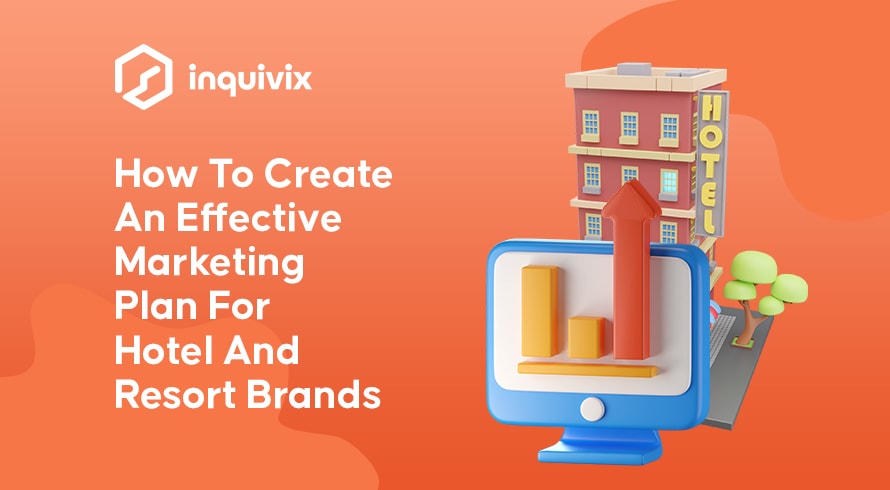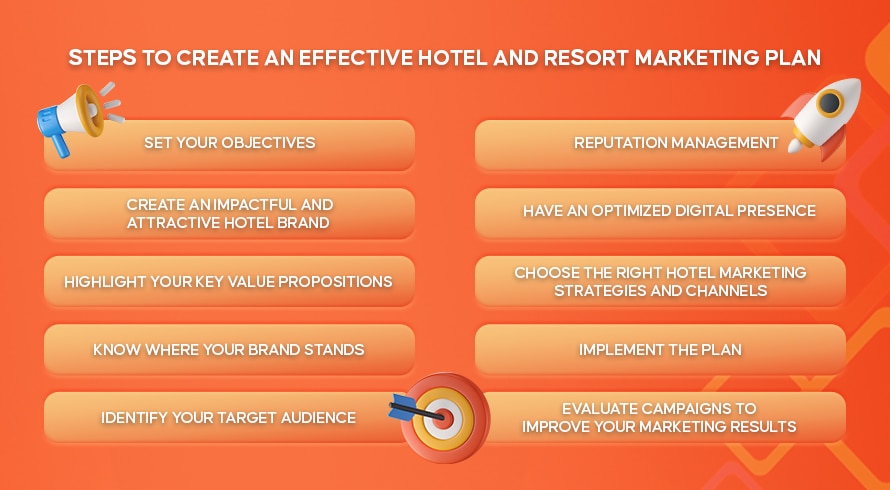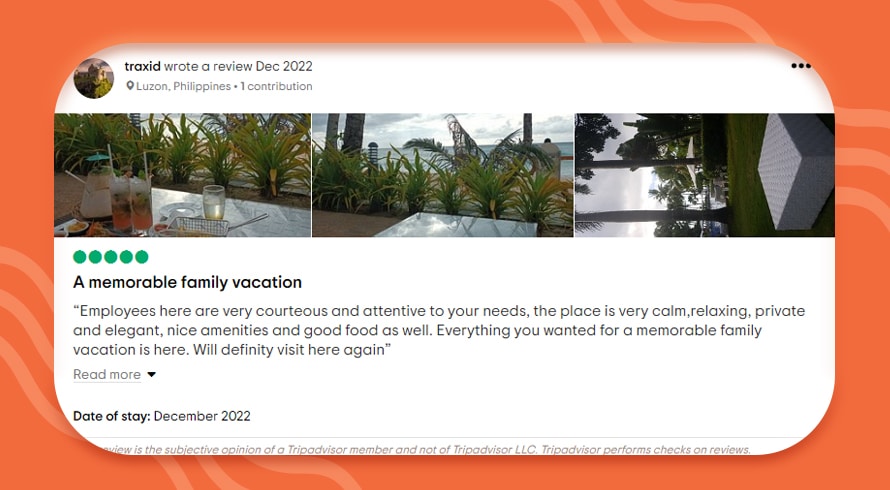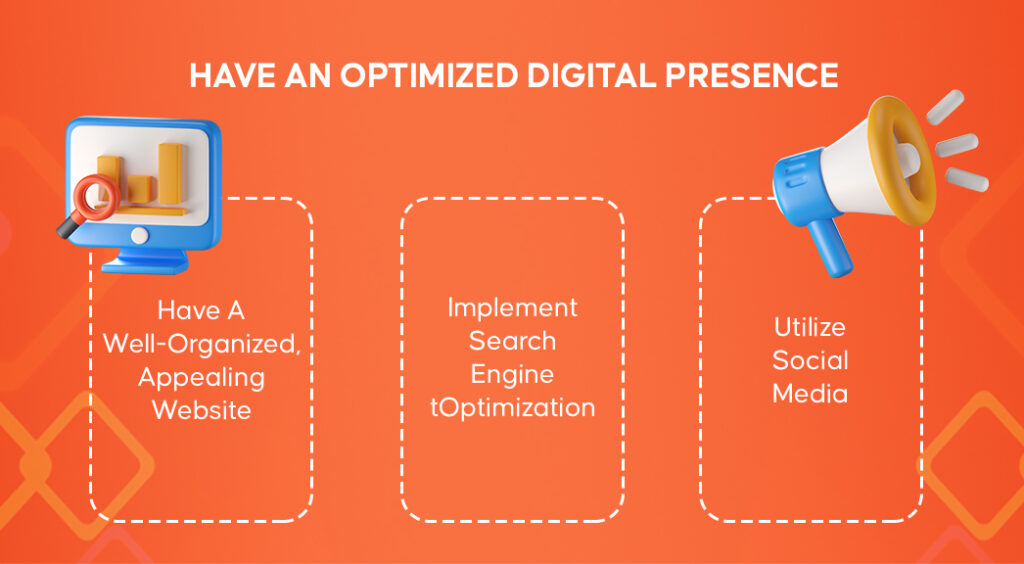Inquivix HQ
1-903, 18 Eonju-ro 146-gil,
Gangnam-gu, Seoul, Korea
06057

Creating a successful marketing plan for hotel and resort brands can be an intimidating project, but it doesn’t have to be! With the right knowledge and strategies in place, you’ll be able to successfully market your brand with confidence.
In this blog post, we’re going to walk you through how to develop a comprehensive yet effective marketing plan tailored specifically toward hotels and resorts. You’ll learn actionable steps that can help maximize visibility amongst potential guests while ensuring the most optimal return on investment (ROI). So if you’re ready to create a well-crafted marketing plan that will leave your competitors rivaling for bookings – stick around as we go into detail about exactly how you can do just that!
What Is A Hotel And Resort Marketing Plan?

A hotel and resort marketing plan outlines the strategies, tactics, and objectives that are needed to promote your hotel or resort. It should include an analysis of your current situation (including strengths, weaknesses, opportunities, and threats), as well as specific objectives you want to achieve over a designated period of time.
The marketing plan for hotels should also include detailed information on how you will target potential customers, create engaging content, build relationships with customers, increase brand awareness, manage customer feedback, track results, and more.
Having this information can help you identify opportunities for improvement as well as areas where you can capitalize on existing successes. This will help you create a cohesive strategy that covers all bases so that you can maximize your return on investment (ROI). while also helping you budget for marketing activities more effectively. There are many other benefits which have been explained further below.
The Importance Of Having A Hotel And Resort Marketing Plan
Having a well-defined hotel and resort marketing plan helps ensure that all of your efforts are working towards the same goal—maximizing profits for your business. It also allows you to measure progress over time so that you can make adjustments if necessary. Without one, you may find yourself wasting valuable resources on ineffective campaigns or missing out on opportunities because you don’t have an organized approach.
Having a detailed plan in place allows you to stay organized when it comes to managing campaigns or responding to customer inquiries. This makes it easier for everyone involved (managers, staff members, etc) to stay on track toward achieving the desired results. A good marketing plan will also provide insights into customer behavior so that strategies can be tailored accordingly.
Finally, having an effective marketing plan in place gives potential customers the assurance that they’re dealing with a reliable business that has their best interests in mind—which is essential when it comes to building loyalty among customers, especially in the hospitality industry where making guests feel at their highest level of comfort and at home is the goal.
Steps To Create An Effective Hotel And Resort Marketing Plan

Below are 10 actionable steps toward creating a successful marketing plan for your hotel and resort brand.
Set Your Objectives
Before you get started on creating your hotel or resort marketing plan, it’s important to establish your goals and objectives. These should include short-term goals (such as increasing bookings by 10 percent in the next 3 months) as well as long-term goals (such as increasing brand awareness among travelers). By setting clear goals, you’ll be able to measure progress against these targets and make changes where it is required.
Create An Impactful And Attractive Hotel Brand
Crafting a hotel and resort marketing plan requires hoteliers to have a strong hotel brand and a compelling brand identity. An impactful hotel brand can help hoteliers separate the hotel from the marketplace while reinforcing the hotel’s vision and objectives. It is essential to create an attractive hotel brand that stands out and appeals to potential guests.
Building a strong brand consists of strategic planning, such as choosing core values and creating effective messaging. Creating a unique visual identity—such as logos and color schemes—can help differentiate your property from others in the industry and attract potential customers. Additionally, creating engaging content such as blog posts, videos, and photos can also help build loyalty among existing customers while attracting new ones. Having consistent branding also helps elevate a perceivable value and creates trust among customers, ultimately allowing hoteliers to make an impression quickly in the competitive industry.
Highlight Your Key Value Propositions

Creating an effective hotel and resort marketing plan is essential for attracting the right customer base to your business. To ensure successful hotel marketing, you must first understand what your property has to offer that is unique to the hotel and highlight those unique selling points as this is what will ultimately make your hotel stand out from others.
Whether it’s offering unbeatable customer service, high-end amenities, or something else that sets you apart from competitors, emphasizing these benefits should be front and center in your hotel marketing plan. Effective hotel marketing must focus on highlighting the unique features and services that make guests want to stay with you and not one of the other hotels vying for their attention. By accurately highlighting your key value propositions, you can create a hotel and resort marketing plan that will ensure a steady stream of long-term customers.
Know Where Your Brand Stands
You need to know your hotel’s position in the market to know how to effectively build the right marketing plan which uses the right hotel marketing strategy at the stage your hotel is in. This includes analyzing the competition and market trends to see where the brand falls in comparison, along with understanding the marketing budget and resources the brand can pull out to action a successful marketing plan.
Research Competitors & Trends
Researching what other hotels and resorts in your area are doing can give you valuable insights into what’s working—and what isn’t—in terms of marketing strategies that hotels have used successfully (or unsuccessfully). Additionally, keeping track of trends in the hospitality industry can help you stay ahead of the curve when developing your own marketing plans.
Determine Your Budget And Resources
Creating an effective hotel and resort marketing plan requires resources such as staff time, money, technology tools, etc., so it’s important to determine how much budget is available before getting started. It is also helpful to determine which resources are available (e.g., staff skillsets) so that tasks can be delegated efficiently within the team. This will ensure that everyone has the necessary skillsets required to successfully execute the plan without stretching resources too thin or overspending on unnecessary expenses.
Identify Your Target Audience
Understanding who your target audience is and what they are looking for is key when crafting an effective marketing plan. Are you targeting leisure travelers? Business travelers? Families? Once you have identified who your target audience is, you can then tailor your message accordingly. For example, marketing for beach resorts could have striking differences from one beach resort to another with some resorts targeting couples, some targeting families, and so on.
Take some time to research current trends in the hospitality industry and see which ones fit your target market. Knowing who your customers are will help you tailor the message and create content that resonates with them. Additionally, understanding their demographic profile can help inform decisions such as where and how to advertise, as well as which marketing channels are most likely to convert leads into sales.
Reputation Management

Hotel and resort marketing plan success depends on strong reputation management as customer reviews can make or break the hospitality industry. Even the best hotels have a few upset guests. How you handle these guests is what determines the reputation of the hotel. It is important to be proactive in responding to negative customer feedback both in-person and online.
Quickly addressing complaints and rectifying mistakes can show customers that the hotel takes them seriously, which will be reflected in how they view the hotel’s brand image. It is crucial for businesses in this sector to focus on building positive relationships with their guests as it can have a huge impact on whether their hotel marketing plan is successful or not. With almost 85% of travelers checking out reviews online either on OTAs or review sites like TripAdvisor, you’re sure to lose out on guests if your hotel or resort does not have a positive reputation on these platforms which can easily negate the effectiveness of your marketing campaigns.
Have An Optimized Digital Presence

In order to activate a successful marketing plan, it’s important to have a well-optimized digital presence that will draw in customers and help build your hotel business. This includes having a well-organized website, implementing SEO, and having engaging social media accounts to share advertising and marketing assets.
Have A Well-Organized, Appealing Website
Your website should be the first place people come to when they want to find out more about your hotel or resort. That’s why it’s so important to ensure that it is up-to-date, easy to navigate, and optimized for both desktop and mobile devices to encourage easy direct bookings. Update all of the information on the site—including special offers, activities available at the property, pricing information, etc.—so that visitors have access to all of the details they need in order to make an informed decision about whether or not they want to book with you.
In addition, make sure that any images you use are high quality and properly sized so they don’t take too long to load and detract from the user experience. You also want to make sure that each page on the site has a meta description (a short summary of what the page contains) as well as keywords related to your business so search engines can easily rank them in their results pages. Lastly, if possible add a live chat feature where potential customers can get their questions answered quickly and easily without having to leave the page or pick up the phone.
Implement Search Engine Optimization
Search engine optimization (SEO) is one of the most important aspects of digital marketing today. It refers to all of the techniques used by marketers and web developers in order to increase a website’s visibility in search engine results pages (SERPs). This includes things like creating content around specific keywords related to your business, optimizing titles and descriptions for each page on your site, creating internal links between pages on your site, acquiring backlinks from other reputable websites related to yours, improving your local SEO, etc. All of these tactics combined will help you improve both organic traffic (traffic coming from unpaid sources such as search engines) as well as paid traffic (traffic coming from paid advertisements).
Utilize Social Media
Social media platforms offer hotels and resort an excellent platform for connecting with potential guests and building relationships with existing customers. It is important that you have thought about which social networks best fit your brand identity and which ones are most popular among your target audience and built your hotel’s presence there.
If not – it’s important that you include it in your marketing plan. Once you decide on a few social media channels, create accounts on each one and begin interacting with users by responding quickly to queries, sharing relevant content, engaging in conversations, etc. This way, customers feel like they have a direct line of communication with you—which builds trust and encourages them to book with your hotel or resort again in the future!
Choose The Right Hotel Marketing Strategies And Channels

Once you know who your target audience is and the objectives you aim to achieve, it’s time to start looking at which channels and marketing strategies are best suited for reaching the target audience. This includes things like paid search, display ads, email campaigns, PPC (pay-per-click), SEO (search engine optimization), location-based marketing, social media advertising, video marketing, etc.
While digital marketing for hotels and resorts has become increasingly important in recent years, traditional methods still have their place in any successful hotel marketing plan. For instance, print advertising in local newspapers and magazines can still be an effective way to reach potential customers within a certain geographical area. Additionally, radio spots or direct mail campaigns may also be useful depending on who your target audience is and what kind of message you want to get across.
Each of these methods has its own advantages and disadvantages depending on what type of campaign you want to run and how much money you want to spend on advertising. It’s important to do research into each channel and understand how it works before investing time or money into it so that you can make sure you have a successful hotel marketing strategy.
Implement The Plan
Achieving a hotel’s ambitious goals requires breaking down the process into achievable steps. To ensure success, it is essential to create effective marketing strategies with defined timelines, as well as consistently implement each part of that plan – from optimizing your website and content creation to other promotional efforts.
Staying focused on core business objectives while having an organized agenda can help you get there faster. Reaching out for expert guidance through consulting or hotel marketing agencies offers tailored solutions according to your requirements so that nothing gets left behind!
Evaluate Campaigns To Improve Your Marketing Results

For hotel marketing success, it is important to continuously evaluate the results of marketing campaigns, such as website visits and bookings. This can help hoteliers identify what marketing tactics are working and which need to be revised or discarded. By regularly reviewing progress and making necessary changes, hotel businesses will be better equipped to make successful decisions with their hotel marketing plan. In addition, hoteliers should use analytics to identify industry trends in order to engage target audiences and determine ways to improve hotel marketing results. Staying on top of the review process allows hoteliers to develop powerful strategies for continued success.
Build A Hotel Marketing Plan For Maximum Returns
A well-crafted hotel or resort marketing plan is essential for any successful business venture in the hospitality industry. Ultimately, a good hotel and resort marketing plan ensures that no stone goes unturned when it comes to connecting with customers while staying competitive within an ever-changing industry landscape.
If you’re looking to build a successful hotel marketing plan, reach out to us for more assistance!
FAQs
Creating a marketing plan for a resort requires careful consideration and research. Start by researching the target demographic – who are you hoping to attract? Then, develop a strategy that caters to the needs of this group. From there, determine how you will promote your resort with media channels such as radio, newspaper, TV, and online outlets. Strong branding is essential when creating a marketing plan – create memorable visuals, slogans, and taglines that will leave an impression on your audience. Finally, track the results of your plan and reflect on what works best for increasing occupancy rates. With proper planning and effort, your resort marketing efforts can be profitable.
Hotels can attract customers by offering various packages and discounts. These packages can include room upgrades, complimentary meals or drink packages, or a spa day voucher. Hotels should also ensure they have an active and engaging presence on social media platforms, such as Facebook and Instagram, in order to keep existing customers informed of offers and promotions. Furthermore, hotels should aim to stand out by creating unique and memorable experiences for their guests which will make them come back again and again. For example, this could involve interactive activities such as art classes or outdoor walks led by local experts that give the chance to explore the region from a unique perspective.
